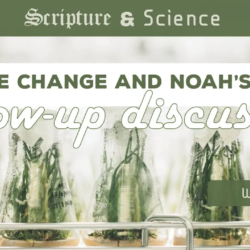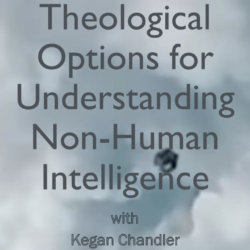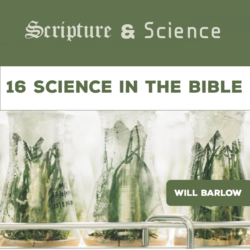Having taken a short break from our Scripture & Science series, we are back. Today begins a series of three episodes exploring evolution. Whether you believe in evolution or not, it’s important to understand what the theory claims and how evolutionists reason. In this episode, Will Barlow briefly explains how evolutionists explain the gradual change from one species to another. He dispels four common misconceptions and delves into the genetic insights popularized by Francis Collins who is both an evolutionist and a Christian.
Listen to this episode on Spotify or Apple Podcasts
See below for notes.
—— Links ——
- We are doing follow-up discussions to these episodes on YouTube. Check them out!
- See other episodes in this Scripture and Science Class
- Check out Barlow’s previous podcast episodes
- Learn more about and support the church Barlow and his team are starting in Louisville, KY, called Compass Christian Church
- Find more articles and audios by Barlow on his website: Study Driven Faith
- Support Restitutio by donating here
- Designate Restitutio as your charity of choice for Amazon purchases
- Join our Restitutio Facebook Group and follow Sean Finnegan on Twitter @RestitutioSF
- Leave a voice message via SpeakPipe with questions or comments and we may play them out on the air
- Intro music: Good Vibes by MBB Attribution-ShareAlike 3.0 Unported (CC BY-SA 3.0) Free Download / Stream: Music promoted by Audio Library.
- Who is Sean Finnegan? Read his bio here
—— Notes ——
Biochemistry and Evolution
• Common misconceptions with evolution
• General framework of evolution
• Modern evolutionary theory
Common misconceptions with evolution
Misconception #1: “It’s just a theory!”
• Often, opponents of evolution will state that it is a theory (and use that term pejoratively)
• However, evolution does account for much of the scientific evidence and has made many successful predictions
Definition of “theory”
“A scheme or system of ideas or statements held as an explanation or account of a group of facts or phenomena; a hypothesis that has been confirmed or established by observation or experiment, and is propounded or accepted as accounting for the known facts; a statement of what are held to be the general laws, principles, or causes of something known or observed.”
-Richard Dawkins, The Greatest Show of Earth, pg. 9
Common misconceptions with evolution
Misconception #2: It means to explain how life began
• Often, opponents of evolution attack the beginning of life problem
• However, evolution does not attempt to account for the beginning of life; this is the theory of abiogenesis
Misconception #3: Evolution says that humans evolved from apes
• This is a vast over-simplification of the theory
• Evolution teaches that all life came evolved from a single organism, so apes and humans share an ancestor
Misconception #4: Evolution is a progression from simpler organisms to more complex organisms
• This is another over-simplification of the theory
• No particular animal alive is more advanced than any prior animal in history
• Current animals are simply better suited to survive than their ancestors
General framework of evolution
Thought experiment: Millions of years ago, there’s an animal named “tom” that is a mammal
• At one point, there is one population of “toms”
• However, some time later, the population splits in two due to a geographical issue (let’s say a mountain pass)
• On one side of the mountain, there is more rain
• On the other side of the mountain, there is less rain and more heat
• Since the populations have been split (and are not sharing genetic information), random mutations occur in each population
• Since the environments are different, the random mutations that lead to “better” alternatives are different
• Over time, these mutations build up into noticeable differences
• Eventually, two new species emerge: “tom a” and “tom b”
Predictions of evolution
Successful prediction #1: Scientists have demonstrated that DNA is more advanced as life is more advanced
• For example, human DNA is 96% similar to chimpanzee DNA
• Yet the number of protein-encoding genes is roughly the same for all animals and plants!
Genetic Complexity
“Our complexity must arise not from the number of separate instruction packets, but from the way they are utilized.”
-Francis Collins, The Language of God, pg. 137
Predictions of evolution
The concept of the “tree of life” is another important prediction of evolution.
We should expect to see intermediate species in the fossil record and the genetic record as we study the world around us.
Support for the tree of life:
• Transition between fish and amphibians — we can find fish that could walk and breathe oxygen
• Genetic sequencing has mostly confirmed scientists’ predictions, with a few surprises!
“At the level of the genome as a whole, a computer can construct a tree of life based solely upon the similarities of the DNA sequences of multiple organisms…. Bear in mind that this analysis does not utilize any information from the fossil record, or from anatomical observations of current life forms. Yet its similarity to c
biology, biochemistry, evolution, what is evolution?, do Christians believe in evolution?, can a Christian believe in evolution?, common misconceptions about evolution, evolutionary theory, Richard Dawkins, The Greatest Show on Earth, ancestors, tree of life, Charles Darwin, speciation, macro evolution, micro evolution, predictions of evolution, DNA, chimpanzee, Francis Collins, The Language of God, fish, amphibians, junk DNA, human evolution, ancient repetitive elements, ARE, genetics,
onclusions drawn from studies of comparative anatomy… is striking.”
Successful prediction #2: Breeders and agriculture experts have demonstrated “micro-evolution” countless times.
• Ex: dog breeds
• Ex: Hybrid crops
• Detractors of evolution sometimes say that micro-evolution is possible but “macro-evolution” is not
• Francis Collins argues that the distinction is an artificial one
Successful prediction #3: Accumulation of “junk DNA”
• Darwin’s theory predicts that mutations that do not affect function (located in “junk DNA”) will accumulate slowly over time
• We see this, as well as “silent” differences in the genetic code
What about man?
Does evolution successfully show that humans evolved?
• Richard Dawkins demonstrates that the fossil record is full of so-called “missing” links
• Perhaps even more powerful, Francis Collins gives evidence for human evolution from genetics
What is Francis Collins’ best piece of evidence?
What happens when we compare the human genome to other animals’ genomes?
What about genes that appear to be non-functional in humans but functional in multiple species?
Fact #1: Comparing human and mouse genomes
• The overall size of the genome is roughly the same
• The inventory of protein-encoding genes is remarkably similar
• The order of genes is generally the same over substantial stretches of DNA
• The existence of similar AREs (ancient repetitive elements)
On AREs:
“When one aligns sections of the human and mouse genomes, anchored by the appearance of gene counterparts that occur in the same order, one can usually also identify AREs in approximately the same location in these two genomes.”
“The process of transposition often damages the jumping gene. There are AREs throughout the human and mouse genomes that were truncated when they landed, removing any possibility of their functioning. In many instances, one can identify a decapitated and utterly defunct ARE in parallel positions in the human and mouse genome.”
Fact #2: Comparing human and chimpanzee chromosomal fusion
“Recently… it has become possible to look at the precise location where this proposed chromosomal fusion must have happened…. But they are found right where evolution would have predicted, in the middle of our second fused chromosome.”
Fact #3: Comparing human and chimpanzee genetic function
• Caspase-12 is a functional gene in chimpanzees (and many other mammals, including mice)
• The human version is found in the identical location as the chimp version, but lacks the function







Thanks, Will. All fascinating material.
By the way, in an Oxford University debate in 2012, with the Archbishop of Canterbury, Richard Dawkins confessed to actually being an agnostic, and not an atheist – as he is not one hundred percent sure that God doesn’t exist. (God bless Richard Dawkins.)
Not long ago my brother accused me of only believing in what our pastor told us. This all transpired when my wife and I were trying to share our gospel with him.
I took it to heart and started digging into what and why I believe. It turned my Christian life upside down.
Here we go again with evolution. After listening to the podcast I find again that what I believe is based upon the common Christian understanding that has been indoctrinated in me. Looking forward to the next podcasts in this series so I can make up my own mind based on scripture and science.
Keep going, Chris. He who seeks will find.
However, unless I get something like a Ph.D. in Molecular Biology, I’m taking a position of ‘reverent agnosticism’ regarding ‘Theistic Evolution’. The bottom line to me is that God created everything (Acts 4:24), but exactly how He did it, is entirely up to Him – and is fine with me.